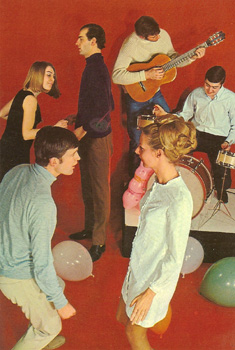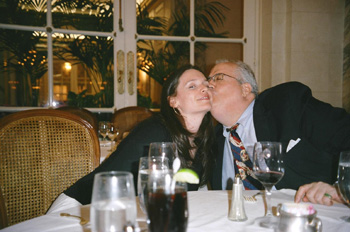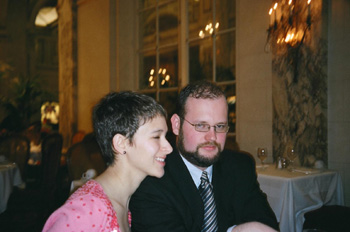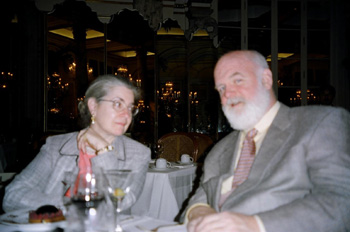Pruning
About twenty-five years ago, I encountered the thought of Norbert Elias, a German sociologist (1897-1990). Elias was interested in, among other things, the process of socialization by which we internalize social norms and so regulate our behavior so as to avoid both coming into conflict with civil authority and giving offense. This massive internalization is one of the sources of our immensely expanded individuality, which grows, so to speak, on suffering in silence. Because others wish to avoid giving offense as well, they are not likely to tell us where we're failing until we have gotten so far out of line that we have figured it out for ourselves.
Consider farting. Once upon a time, farting was a natural phenomenon, no more objectionable than coughing. Then society "evolved," and those who farted in public were ridiculed. After another evolution, it became impolite to notice others' farting. In this final stage, there are two instruments of self-control at work, and people consider themselves lucky to master them both and move on to what's truly interesting in life.
But with the spread of respectable society, as more and more people attempted to pass as "normal" in large cities, the proliferation of self-control mandates left few aspect of life untouched. Consider the classical music concert. The expression of enthusiastic response to great performance is rigorously confined to a certain moment: the moment that follows the conclusion of the performance. Not until then is a member of the audience allowed to demonstrate any mark of appreciation whatsoever. (Snoring is also discouraged.) In fact, behaving oneself at a concert requires the ability to enter a zone of suspended animation.
And I'm all for that, in the case of concerts. But it has occurred to me lately that one of the reasons for the increase in happiness that I'm feeling is that I'm pinching off unneeded habits of self-control. Some of these relate to a former rigidity about housekeeping. I'm learning, for example, to cook only when I want to, and to make use of other resources - such as Eli's really great chicken pot pie, which can be put in the oven at two hundred or less for an indefinite period. (I've gone to at least one concert while it warmed up.) But most of the habits have been intellectual.
Since religious faith has never tugged at my attention, you might wonder at my claiming to be hugely relieved to admit to myself, as I did some time last year, that I know nothing about the existence of divinity. It may exist, and it may not, but I am deeply agnostic. I don't think that was ever a genuine atheist, but I felt so certain that the Judeo-Christian ideas upon the subject are utterly and completely wrong, and quite often wicked, that agnosticism seemed rather limp: I was certain that that deity didn't exist. Well, I'm certain no longer. There may indeed be a just and loving God behind all the poison of the Torah and the Epistles. I don't believe that there is, but that's something else altogether. I have cast off the burden of an unnecessary habit of mind.
Because modern education, of which formal schooling is only a small part, is a very complex affair, it's no wonder to me that I'm doing this pruning in my late fifties. We spend decades learning what's there to be learned, without much time for the luxury of estimating the value of things that in fact we don't yet know. And there is so much to be learned, so much that has been useful to other people. It takes rather a long time to discover that what helped someone else in a similar situation might not in fact help me. This or that little trick for making life agreeable may turn out to be rather more trouble than it's worth. You don't know going in, and, if you're curious about knowing more, you don't resist learning.
And there may be a moment in life when it seems that all that one has done is to have acquired such habits. Things are done automatically, not to satisfy desire. Because it is so universally thought that a vacation in the sun is a good thing, you may wake up one day wondering why you're in Florida - you'd rather be at home. Or touring a foreign city. Your passions may seem clear to you (don't take them for granted!), but between your passions and genuine stillness there are sure to be legions of whirring automata, urging you - unconsciously for the most part - to do things that perhaps don't need doing, not even for the sake of virtue.
The other day, I was reading a blogger's lament about unhappiness, and it sparked what I've been writing here. Because I don't mean to appear to be handing out advice, I'll keep his URL to myself. Given its subject matter, his entry could easily have been tedious or whining or even repellent. But I sensed that he was beginning to get his hands around what the trouble was, even if he didn't know that. He was asking, "What do I want to do in this life?" It's a question that's not asked often enough. We don't most of us want to confront the question, for on the one hand it suggests a dizzying scope of possibility while on the other it reminds us of how unfree we usually feel, constrained by the circumstances at hand. A real answer to the question, moreover, will almost certainly put us down for a lot of work. The pursuit of happiness is hard. And clearing out the debris of useless self-controls is only a part of it.
The pruning requires a lot of care. Don't listen to anyone who urges you to relax into the moment and appreciate the totality of the environment, as if relaxation were somehow the key. I don't ever want to have to give my table manners a second thought, or to learn again how to shake hands. Speaking and writing correctly are monstrously large and manifold engines of self-control, and I'd never read or write anything if I had to give them the attention that, even after a year of lengthy lessons, speaking and writing French still require. (I can make myself understood, but that's not where the bar is.) I close closet doors and I always put the lid down on top of the seat. But I'm beginning to want to have the smallest possible library - quite a different objective from the wanting, as I used to do, the largest. I think that I already know what I want to do with this life - I'm doing it right now. But I'm also learning where happiness lies inside me, and I'm clearing the paths.








